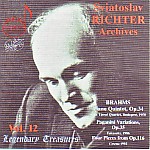While the Brahms selections in Doremi’s twelfth Sviatoslav Richter Archives release do not add to this pianist’s recorded repertoire (with one exception, the D minor Capriccio Op. 116 No. 7), Richter fans still will want them, and for good reason. His collaboration with the Tátrai Quartet in the Piano Quintet (recorded live in Budapest on February 13, 1958) yields more animated and flexible results than in his relatively formal though no less powerfully projected studio version with the Borodin Quartet.
The Allegro non troppo’s tempo fluctuations ebb and flow with a naturalness that prevents the music from sounding sectionalized. It takes a few minutes for the Andante’s pulse to lock in, but the Scherzo’s rapid clip and muscular demeanor quickly establish themselves. Here and in the Finale’s introduction the Tátrai gives what amounts to a master class in how to generate tension at the softest decibels.
The Paganini Variations stem from an October 16, 1986 recital in Takasaki. They prove technically and musically superior to the relatively stiff and less accurate 1988 live version included in Philips’ Authorized Richter Edition. Younger, friskier-fingered competitors can learn a lot from the master. For example, in Book 1 Richter dispenses with the push/pull rubatos many pianists impose upon Variation 4, and consequently the trilled motive gains urgency and momentum. He pays rare attention to Variation 7’s sustained tenor voice and tosses off Variation 13’s octave glissandos with no effort. By the time Book 2 kicks in, Richter is totally warmed up, as his suave double-note mastery and gorgeous legato technique bear out. Incidentally, in Variation 8 Richter observes the ossia on the repeats.
The disc closes with four of the Op. 116 Klavierstücke, recorded during a Cesena recital on April 11, 1992. The G minor (No. 3) is a shade stern and heavy-handed, while Richter’s pedaling through No. 5’s rests ruins the intended offbeat effect of the composer’s phrase displacements. Yet the brisk and imaginatively phrased No. 5 and strongly swirling No. 7 more than compensate. The sonics are passable (Op. 35), mediocre (Op. 34), and poor (Op. 116).
































